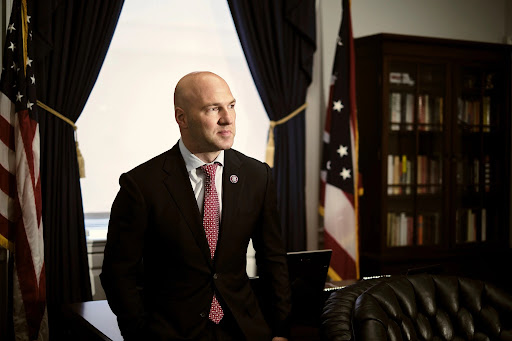Anthony Gonzalez and the Future of the GOP

Image Courtesy of T.J. Kirkpatrick for The New York Times
By Christian Rubio
On September 16, Representative Anthony Gonzalez of Ohio’s 16th district, one of the ten Republicans in the House who voted to impeach former President Trump in his second impeachment earlier this year, announced that he will not seek reelection.
In his statement, the 37-year-old father of two emphasized the importance of prioritizing his family, saying that “the best path for [his] family is not to seek re-election next fall.” However, undoubtedly the most striking and notable part of the statement comes later.
“While my desire to build a fuller family life is at the heart of my decision, it is also true that the current state of our politics, especially many of the toxic dynamics inside our own party, is a significant factor in my decision,” Gonzalez said.
Gonzalez certainly set himself apart from the GOP at large when he voted for Trump’s second impeachment. The overwhelming majority of Republicans took the stance that the former president was not responsible for the violence that took place at the Capitol on January 6, a far cry from Gonzalez’s statement at the time.
“The President of the United States helped organize and incite a mob that attacked the United States Congress in an attempt to prevent us from completing our solemn duties as prescribed by the Constitution,” he said.
Gonzalez was among eight out of ten House Republicans who voted for impeachment to be censured by state or local Republican parties, pointing to the GOP’s intention to continue moving in a heavily pro-Trump direction. Trump himself responded to Gonzalez’s announcement, saying “1 down, 9 to go!”
Gonzalez is the first of the ten representatives to announce his retirement, but two of the seven Senators who voted to convict have already decided not seek re-election: Richard Burr of North Carolina and Pat Toomey of Pennsylvania. Four of the other five are not up for reelection until 2024 or 2026 and could still come to the same decision.
While it is still uncertain how rapid their departure will be, the future seems bleak for anti-Trumpers in the GOP on its current trajectory. Various factions on the right have their respective opinions about this, but what does it mean for the GOP electorally going forward?
The 2022 midterm elections and the Republican primaries leading up to them will certainly be informative, but for now one place we can look for insight is the recent California recall election. Polls showed a razor-thin margin until around August 24, when they started to lean heavily in favor of Governor Gavin Newsom. What happened? On August 14, Larry Elder, the frontrunner to replace Newsom asked for a “mulligan” on his assertion, made only a few days earlier, that President Biden won the 2020 election “fair and square.”
One obviously should not reduce Elder’s slip in the polls and subsequent defeat to this single factor, but it undoubtedly had an effect. And so an interesting problem presents itself: the GOP and its base are fully committed to Trump, but absolute loyalty to the former president does not seem to be an electorally viable position nationwide moving forward, at the local and national levels.
Elder is not the only example; Republican Senator Ben Sasse of Nebraska, a harsh critic of Trump and one of the seven Senate Republicans to vote for his conviction in January, outperformed Trump by 8.88% in Nebraska last November. Even though Trump’s second impeachment took place after the 2020 election, the Republicans who voted for it in the House and Senate are a good representation of Trump’s strongest opposition in the GOP. Of the 13 members of this group who were up for re-election, all but one of them outperformed Trump in their respective states and districts, by an average margin of 5.32%. Furthermore, Sasse, arguably the most recognizable member of the group, outperformed him by the largest margin.
And so the GOP faces a dilemma: the candidates that seem to be more viable in general elections are not necessarily the same ones likely to survive Republican primaries. A massive deciding factor in the party’s future will be whether Trump decides to run for president again in 2024. Running against him would likely be political suicide for any Republican whose base consists primarily of Trump-loyalists. In that scenario, Trump could remain the face of the GOP for as long as the next seven years.






